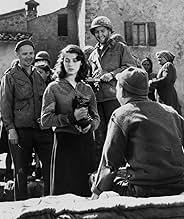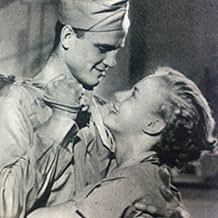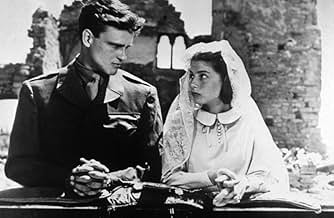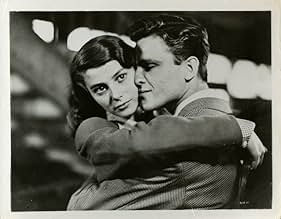Agrega una trama en tu idiomaA reluctant soldier, Peter, serves in Italy during WWII. He marries a local girl named Teresa and brings her to the US.A reluctant soldier, Peter, serves in Italy during WWII. He marries a local girl named Teresa and brings her to the US.A reluctant soldier, Peter, serves in Italy during WWII. He marries a local girl named Teresa and brings her to the US.
- Dirección
- Guionistas
- Elenco
- Nominado a 1 premio Óscar
- 1 premio ganado y 2 nominaciones en total
Lewis E. Ciannelli
- Cheyenne
- (as Lewis Cianelli)
Guido Martufi
- Sergio Russo
- (sin créditos)
Opiniones destacadas
This is one depressing movie. So many of the lead characters are unpleasant, it really is difficult to know where to start. Let me begin with the most unpleasant character of all. John Ericson. He began as a Mama's Boy, joined the Army and became a misfit and coward, married and was a lousy husband, and finally walked out on his responsibilities as a father. Throughout the movie he whines, cries, and bitches about his lot in life. One has to wonder, even with the demands of war, how he ever got into the service. In his first encounter with the enemy - he is reduced to a quivering blob crying for his buddy and finally ending up in the loony ward with "battle fatigue".
He gets married to Pier Angeli (more later) in Italy just as the war ends. It baffles me how the Army would ever give permission to a guy like him to marry anyone. Once he rotates and his child-bride joins him at home in New York, we begin to discover what a worm he really is.
His mother dominates him and his father is a total wimp. His sister is a totally unlikable snot. The movie keeps flashing forward to his visit with a mental health pro at the VA. I don't know why. There is nothing they could do for him, although the writers would like you to think so. His problem is his mommy, but he attaches himself to anyone he thinks can prop him up. Aggh, it irritates me just to talk about him.
Pier Angeli, on the other hand, makes this movie. Her performance (at 18 yo) is dazzling. She is beautiful, sensitive, and totally sincere. She is clearly in love with Phillip, and wise enough to understand his problem - even if he won't.
It is, as I said, an unpleasant movie. But it was well shot and, I have to admit, a thoughtful movie. All in all, it was worth watching.
He gets married to Pier Angeli (more later) in Italy just as the war ends. It baffles me how the Army would ever give permission to a guy like him to marry anyone. Once he rotates and his child-bride joins him at home in New York, we begin to discover what a worm he really is.
His mother dominates him and his father is a total wimp. His sister is a totally unlikable snot. The movie keeps flashing forward to his visit with a mental health pro at the VA. I don't know why. There is nothing they could do for him, although the writers would like you to think so. His problem is his mommy, but he attaches himself to anyone he thinks can prop him up. Aggh, it irritates me just to talk about him.
Pier Angeli, on the other hand, makes this movie. Her performance (at 18 yo) is dazzling. She is beautiful, sensitive, and totally sincere. She is clearly in love with Phillip, and wise enough to understand his problem - even if he won't.
It is, as I said, an unpleasant movie. But it was well shot and, I have to admit, a thoughtful movie. All in all, it was worth watching.
This movie launched the feature film debut of four actors that would later go on to reach some success: Pier Angeli, John Ericson, Ralph Meeker, and Rod Steiger. It was also the first of three films for Bill Mauldin, a famous illustrator for "The Stars & Strips" (the military's newspaper during World War II). The only known actors in the movie were Patricia Collinge (The Little Foxes) and Peggy Ann Garner (A Tree Grows in Brooklyn).
The movie begins with Philip Cass (John Ericson) in a session with his VA psychologist, Frank (Rod Steiger), after returning from the war in Italy. He is having trouble fitting in with civilian life.
His story is related to us in flashback— While serving in Italy, Philip is clearly scared and unable to fight the German enemy until Sgt Dobbs (Ralph Meeker) steps in to guide him to fight. During a battle with the Germans, Philip's assignment is to hide in the bushes and let the Germans pass him by and then shoot up a flare for US soldiers to be ready to fight them down steam Unable to do even this, he is sent to a local hospital with battle fatigue. There he learns that Dobbs had been killed in the fight. Filled with guilt and shame, he hides his head in the pillow and cries.
While in Italy, he and a group of US soldiers are assigned to bivouac in an Italian home. There, he meets, dates, and falls in love with a young Italian girl, Teresa (Pier Angeli). They get married and have a honeymoon in Rome. When he ships out for the US, he must leave his war bride behind until she is authorized to join him.
This brings us back to his private battle in the US: He must find a job and make his own home. But, to do this, he must face his possessive mother, Patricia Collinge, and spineless father, Richard Bishop. There are some fine scenes in this movie, especially between, John Ericson and Pier Angeli. However, there is nothing subtle about the story, which "hits us over the head" rather than simply indicating its meaning.
The movie begins with Philip Cass (John Ericson) in a session with his VA psychologist, Frank (Rod Steiger), after returning from the war in Italy. He is having trouble fitting in with civilian life.
His story is related to us in flashback— While serving in Italy, Philip is clearly scared and unable to fight the German enemy until Sgt Dobbs (Ralph Meeker) steps in to guide him to fight. During a battle with the Germans, Philip's assignment is to hide in the bushes and let the Germans pass him by and then shoot up a flare for US soldiers to be ready to fight them down steam Unable to do even this, he is sent to a local hospital with battle fatigue. There he learns that Dobbs had been killed in the fight. Filled with guilt and shame, he hides his head in the pillow and cries.
While in Italy, he and a group of US soldiers are assigned to bivouac in an Italian home. There, he meets, dates, and falls in love with a young Italian girl, Teresa (Pier Angeli). They get married and have a honeymoon in Rome. When he ships out for the US, he must leave his war bride behind until she is authorized to join him.
This brings us back to his private battle in the US: He must find a job and make his own home. But, to do this, he must face his possessive mother, Patricia Collinge, and spineless father, Richard Bishop. There are some fine scenes in this movie, especially between, John Ericson and Pier Angeli. However, there is nothing subtle about the story, which "hits us over the head" rather than simply indicating its meaning.
A movie of note only because it stars a 19 year old Pier Angeli, who plays an Italian girl who meets an American solider (John Ericson) during the war, and marries him shortly thereafter. Angeli is bright-eyed and radiant, and I loved her conversations with her family in Italian, even if they weren't subtitled (maybe even more so because they weren't). Briefly seeing some of the sites in Rome was also nice. Unfortunately, Ericson is not nearly as good as Angeli. His character is admittedly difficult to play and not all that likeable, suffering from panic attacks, lack of confidence, and overall wishy-washiness. I loved how the film is honest in its depiction of war, showing us fear and cowardice, but unfortunately there are no real consequences to it. There are hints at the generation gap of the 1950's, but Ericson is no James Dean. The story telling from director Fred Zinnemann is too segmented and scattered, shifting from war film, to war bride film, to domineering mother film. Patricia Collinge is brilliant as the mom, particularly as we come to understand just how controlling she is, but it's at a point in the film where we just don't see the focus. The ending is also abrupt and unbelievable, as if the filmmakers didn't where to go with it either.
Fred Zinnemann's attempt at Neo-Realism is a drab story about a soldier who brings his war bride back to America to live with his disappointment of a father and his overbearing mother. Pier Angeli, as the bride, is lovely, but John Ericson, as the soldier, isn't up to the acting challenge asked of him. Patricia Collinge is decent as his mom, but everyone is done a disservice by Zinnemann's detached direction. I think he was going for understated realism but everything is so understated as to be lacking in any kind of emotional impact whatsoever.
"Teresa" received a 1951 Oscar nomination for Best Motion Picture Story, a category that later was absorbed into the Original Screenplay Oscar.
Grade: C
"Teresa" received a 1951 Oscar nomination for Best Motion Picture Story, a category that later was absorbed into the Original Screenplay Oscar.
Grade: C
This is a Tough One to Like because while it is Filmed Exquisitely and the Performances are Top Notch, it is a Movie that has some Very Unlikable Characters. Necessity Determined to Show the Flaws in these Folks, because that's the Story being Told, it is Nevertheless Not Very Entertaining.
Film Noir can Approach the Angst and Suffering of Returning Vets with Stylistic Flourishes and a Snappy Script. But here it is the Drumbeat of Dreadful Psychological Impairment Suffered by John Ericson from Frame One that is a Heavy Load and is Never Lightened by the Angelic Pier Angeli.
She has a Viginal Charm Combined with a Worldly Wisdom brought on by the War and Her Family's Condition. They Live in a Bombed Out Building, Her Brother has an Amputated Arm, and They are All Next to Starvation.
So After She Marries this Basket Case with a Mother Fixation She is Believably Up to the Task of Supporting His Debilitating Condition Until the Inevitable Hollywood Happy Ending that is Typical of MGM's Take on Film-Noir and Socially Relevant Stories.
Overall, Above Average and should be Given Kudos for an Attempt to take a Look at some Disturbing Psychological Impairments that were Never MGM's Strong Suit.
Film Noir can Approach the Angst and Suffering of Returning Vets with Stylistic Flourishes and a Snappy Script. But here it is the Drumbeat of Dreadful Psychological Impairment Suffered by John Ericson from Frame One that is a Heavy Load and is Never Lightened by the Angelic Pier Angeli.
She has a Viginal Charm Combined with a Worldly Wisdom brought on by the War and Her Family's Condition. They Live in a Bombed Out Building, Her Brother has an Amputated Arm, and They are All Next to Starvation.
So After She Marries this Basket Case with a Mother Fixation She is Believably Up to the Task of Supporting His Debilitating Condition Until the Inevitable Hollywood Happy Ending that is Typical of MGM's Take on Film-Noir and Socially Relevant Stories.
Overall, Above Average and should be Given Kudos for an Attempt to take a Look at some Disturbing Psychological Impairments that were Never MGM's Strong Suit.
¿Sabías que…?
- TriviaFilm debut of Rod Steiger.
- ErroresWhen the ambulance backs up to the hospital in front of the church, a set of four studio lights is reflected in its rear windows.
- Citas
Mrs. Clara Cass, Philip's Mother: [to Philip] You'll never be a salesman, sonny.
- ConexionesFeatured in The Metro-Goldwyn-Mayer Story (1951)
Selecciones populares
Inicia sesión para calificar y agrega a la lista de videos para obtener recomendaciones personalizadas
- How long is Teresa?Con tecnología de Alexa
Detalles
- Fecha de lanzamiento
- País de origen
- Idiomas
- También se conoce como
- Die Geschichte einer Braut
- Locaciones de filmación
- Scascoli, Loiano, Bolonia, Emilia-Romaña, Italia(Italian village scenes)
- Productora
- Ver más créditos de la compañía en IMDbPro
- Tiempo de ejecución1 hora 42 minutos
- Color
- Relación de aspecto
- 1.37 : 1
Contribuir a esta página
Sugiere una edición o agrega el contenido que falta

Principales brechas de datos
By what name was Teresa (1951) officially released in Canada in English?
Responda































